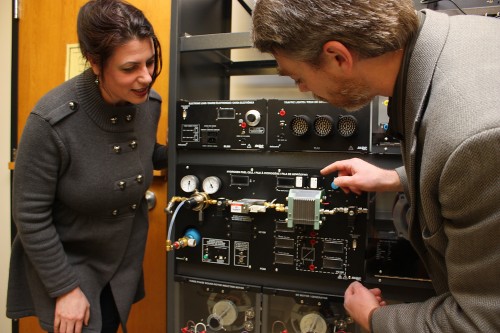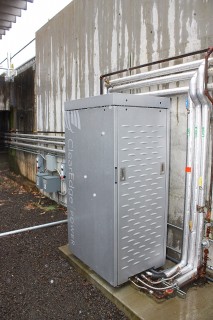This content was published: March 25, 2013. Phone numbers, email addresses, and other information may have changed.
PCC fuel cell class set to power up this spring
Photos and story by James Hill
Portland Community College is firing up another option for the public to explore green careers.
The Electronic Engineering Technology Program at the Sylvania Campus (12000 SW 49th Ave.) and ClearEdge Power in Hillsboro partnered to create the elective class “Introduction to Fuel Cell Systems,” or EET 199A. The course, which is the only one of its kind at an Oregon community college, has just a few pre-requisites and is open to the public. It will be offered this spring term and during winter terms in the future.

Electronic Engineering Technology Chair Sanda Williams and ClearEdge’s Vice President of Engineering Tom Prevish inspect one of three Lab-Volt hydrogen fuel cell training systems that will be used for the new class.
The class starts April 4 and will explore fuel cell technologies used for distributed power generation, covering processing, electronics, tools, performance evaluation, troubleshooting, codes and permitting, safety procedures and career planning. Course credit can be applied toward earning a comprehensive Renewable Energy Systems certificate or two-year associate’s degree, which prepares students to be operators and technicians in the solar, wind, fuel cell and other renewable energy fields.
“The lab will be structured to give the students hands-on experience with as many different types of components used in actual fuel cell systems as possible,” said instructor Tom Prevish, who is Vice President of Engineering for ClearEdge. “This class is going to be general enough that people can apply the skills they learn to work on a variety of clean energy technologies.”
The class is an example of how industry and education come together to create training opportunities. As part of PCC’s bond construction, ClearEdge unveiled two state-of-the-art fuel cells in 2011 that provide cost-saving power to Sylvania’s Health Technology Building and heat to its swimming pool. From there, the Electronic Engineering Technology Program approached the company about developing a general course related to fuel cell systems that could be open to the public.
“Tom was instrumental in the development of this course,” said Sanda Williams, chair of the program. “He proposed all the equipment purchases and created the course outline.”
The program purchased three Lab-Volt hydrogen fuel cell training systems needed for the class’ labs thanks to a $98,000 grant from Sylvania’s Green Fund. The fund supports projects that link the bond construction work at Sylvania to sustainability projects that are focused on creating learning lab opportunities for students. The 50-watt stations realistically represent the basic functions of hydrogen fuel cell systems.
“The HT building fuel cell project and having ClearEdge as a partner naturally led to the creation of curriculum to support students interested in learning fuel cell technology and sustainability science in general,” said Dieterich Steinmetz, dean of Sylvania’s Science and Engineering Division. “Many thanks go to ClearEdge, both for their support of the campus HT fuel cell project and their invaluable work with faculty to create the fuel cell curriculum.”
Beyond the fuel cells course, the equipment will be used in other existing Electronic Engineering Technology classes and the unit’s gas measurement devices may be shared with the chemistry department, said Williams. On top of all that, ClearEdge is exploring setting up internships for students enrolled in the course to develop a pathway to green energy careers.
“They’ll be able to jump right in a lot faster with a start-up company like ClearEdge,” Prevish said. “That is very important to us.”

